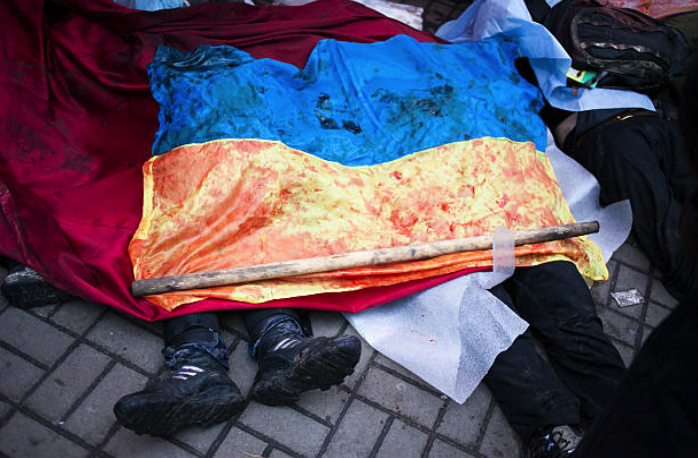“Pick a scar on your body and share the story of how you got it with the other people here.”
Recently, a colleague introduced me to this way of starting a training workshop with a group of strangers.
Our group consisted of people who all actively participated in the Maidan Revolution in Ukraine, which started five years ago this past week. They stood on a frozen civic square behind the burning barricades; they drove the daily events of pushing out a puppet president; they sent a strident message of change to their own nation and the watching world. In subsequent years, many have lost colleagues and loved ones to the imposed violence in the eastern part of their country.
They all toil still for their turbulent but compelling country’s tomorrow – as leaders of charities and advocacy groups, as journalists, as newly-minted civil servants, or as IT and business innovators. Some may pivot from throwing rocks at a dictator’s drugged-up security force to securing progress through the parliamentary ballot box in Ukraine’s 2019 elections.
In the conference room of a small Kyiv hotel, one guy told of getting a beer bottle cracked on his then skinhead skull during a street brawl; he now runs an art gallery that doubles as a hub for democratic dialogue. A woman who provides a dynamic youth leadership program spoke of her Caesarean scar as a constant reminder of how birth and pain often go together. As the stories were told around the room, I noticed the members of the group respecting each other through deep listening and empathy.
As striking as the stories all were, what most moved me was the intense way these folks went straight to the intimate part of their lives – their willingness to quickly and unconditionally open up about what keeps them going forward even when the horizon is hidden. Perhaps, based on shared suffering for a greater good, these folks are more capable of cutting a clear course for the future.
After making our ‘vulnerabilities visible’ at the outset, the workshop discussion that followed was among the most dynamic I’ve ever born witness to or facilitated, including with cabinet and board-level personnel here in Australia.
It was in contrast to my customary Australian context where our professional interactions – and political dynamics – are very often characterised by minimising long lists of risks rather than making any new reality. Our apparent default mode is to respond rather than reveal or renew.
Our own scars and vulnerabilities are not for visibility or discussion. They are for denial through Photoshop or Botox.
Maybe where there’s a lot at stake – like a country’s very existence – people have a more poignant sense of purpose and the pace and principles with which to pursue it. Whereas in Australia, where democracy is equated to sausage sandwiches rather than serious struggle, we perhaps have the luxury of ‘disposable debate’.
It seems we have spare societal capacity to waste on continually changing leaders for no real reason, arguing about words rather than ideas, and being obsessed with “gotcha” and gamesmanship rather than social gains.
Even if we invest 90 per cent of our time in being outraged by the small stuff, as we sometimes seem to do, the reality is that 90 per cent of business and public life will go forward unfazed. Ironically, our culture of consistent complaint doesn’t even seem to produce any real results.
Yet, we are anchored to anger and anxiety.
The upper middle-class soccer sideline parents of Balmain constantly get fined in the district comp for abusing teenage referees. Our typical response to regularised road rage isn’t concern about people’s safety, but to get out our mobiles and start filming. We abuse the kids at Coles’ counters because they don’t permit us a plastic bag. Voters get righteously scolded at polling booths for not recycling their ‘how to vote’ sheets. The process of defriending someone on Facebook after a digital dispute has almost become one of our ‘rage rituals’.
Why are so many of us worried or pissed off so much when frankly life’s objectively good for most of us? (If it’s possible and it’s not to put aside our Indigenous community.) When did the ‘autopilot’ for many become a barely contained fury about our commutes, our politicians, our mortgages, or comments on social media? How did cynicism supplant sympathy?
When exactly did we lose our shit and become so poorly mannered?
Ninety-ninety two. That was the first of 27 straight years without a real recession – basically the only place in the world with such a positive record. We’ve escorted nearly two generations into unparalleled economic wealth – we eat better than the monarchs of the nineteenth century (while we watch our cooking shows and order UberEats at the same time).
So, let’s call it for what it is. Along that way – when the number of Australians who ski has outstripped those who surf or play cricket – we have become spectacularly spoiled. Our mantra is tantrum.
We behave accordingly – poorly and often with meanness – in our organisations, our personal relationships and our politics. Bullying has become a standard part of the social landscape to somehow be traversed, and for which we need GPS in the form of elaborate rules and procedures. Sadly, it looks like malice is the new normal that needs to be regulated against.
How do things become ‘normal’? In post-war Great Britain, dairies started to put little foil tops on the glass milk bottles delivered to people’s homes. Beginning with two birds in one suburb, a process of social learning ensued among British Tits, and apparently within two years, each bird of that species in the UK had learned how to lift the lids and take sips of fresh milk.
Combine our spoiled status with our own social learning – accelerated by digital dissemination as opposed to IRL (in real life) – the really worrying part is not what’s happening but where will it end.
A study at Loyola University in the United States tested the concept “that brain chemistry and passive observation of aggressive behaviour together produce heightened aggressive tendencies in lab rats. The rats who watched aggressive behaviour in other rats responded by developing more receptivity in their amygdalas than rats who did not observe aggression. So, just by watching their rodent colleagues bash each other, the observer rats developed greater potential to be aggressive themselves.”
Robert Sutton of Stanford University has devoted a career to studying bad behaviour – or, more simply put, assholes. The empirical evidence he has gathered shows that asshole-like behaviours like hostility and malicious disrespect are actually “infectious” in our workplaces – and by correlation our broader society – partly because psychologically ‘like attracts like’.
At this point in an article, one might turn to suggestions and ideas about how to fix this fine mess. Some five-point plan to restore civic decorum and decency. If only there was some easy theory of change.
I’ll offer but one thought based on those people I got to know in that Kyiv workshop – people who are genuinely nation-building on another much less prosperous and much less peaceful side of the planet.
Show somebody your scar today.
Pete Shmigel has formerly been a senior advisor to premiers and ministers and the CEO of Lifeline Australia. As a consultant, he is currently providing leadership training in Ukraine, including at the Ministry for Health.
Got something to add? Join the discussion and comment below.
Got something to add? Join the discussion and comment below.
Get 10 issues for just $10
Subscribe to The Spectator Australia today for the next 10 magazine issues, plus full online access, for just $10.


























Comments
Don't miss out
Join the conversation with other Spectator Australia readers. Subscribe to leave a comment.
SUBSCRIBEAlready a subscriber? Log in